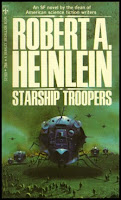 I realize I have been discussing a lot of Robert A. Heinlein's fiction on this blog, and I would like to justify it. I have a strong predilection for Heinlein's works, mostly because of his remarkable ability to blend philosophical topics and entertaining science fiction. After all, he did help found the genre of "classic" science fiction, and because of the nature of what he discusses in his works, Heinlein novels are the perfect topics for this blog. Anyway, on to business: today I would like to talk about some more of the political concepts Heinlein explores in Starship Troopers.
I realize I have been discussing a lot of Robert A. Heinlein's fiction on this blog, and I would like to justify it. I have a strong predilection for Heinlein's works, mostly because of his remarkable ability to blend philosophical topics and entertaining science fiction. After all, he did help found the genre of "classic" science fiction, and because of the nature of what he discusses in his works, Heinlein novels are the perfect topics for this blog. Anyway, on to business: today I would like to talk about some more of the political concepts Heinlein explores in Starship Troopers. First, I would like to continue my discussion of whether Starship Troopers is a fascist manifesto or a libertarian one. Though the narrator’s voice is clearly fascist and slightly militarist, I believe Heinlein has inserted a few hints to show the reader that he is not actually promoting fascism.
Throughout the book there are several “messages” that the characters meant to represent authority or reason pound into the head of the main character: the idea that individuals have duties to the state, Social Darwinism, and the rejection of Marxian communism. Also, note that even though the system in Starship Troopers is democratic, it does not rule with the approval of everyone it governs. However, though the main character describes this system as idea, Heinlein inserts some very subtle clues that hint at his real message.
The first is the belief that “all wars arise from population pressure.” Heinlein’s characters half-prove this with his assertion that man is a wild animal, but the quote is actually an obvious reference to Hitler, who once said something similar. Also, one of the characters goes on to assert that even the Crusades were caused by population pressure, which is obviously wrong. The character then goes on to say:
“Nevertheless, let's assume the human race manages to balance birth and death... and thereby becomes peaceful. What happens? Soon (about next Wednesday) the Bugs move in, kill off this breed which 'ain't gonna study war no more' and the universe forgets us.... Both races are tough and smart and want the same real estate....But does man have any 'right' to spread throughout the universe?...The universe will let us know—later—whether or not Man has any 'right' to expand through it.”
This Social Darwinist perspective is a clear satire of fascism, and it hints at the fact that Heinlein’s message is not what it seems.
The next clue is the most obvious: one of the characters states: “The basis of all morality is duty, a concept with the same relation to group that self-interest has to individual. [In 20th century America] nobody preached duty...the society they were in told them endlessly about their "rights"…No nation, so constituted, can endure.”
This is an obvious clue because of Heinlein’s proclamation of his libertarian views; in The Moon is a Harsh Mistress, he proudly declares that the state can never place it’s survival over an individual.

At first, Heinlein’s libertarian views seem to clash with his opinions about sacrificing oneself to help others. However, there is actually no conflict between the two: Heinlein wanted society to give people the freedom to do what they want, but he greatly respects those who are willing to work to help others. A society which subjugates people and forces people to live for others—or for the state—is something else entirely.
Heinlein also makes references to the POW’s rumored to be held by the North Koreans and Chinese after the Korean War; in the novel, one of the characters (a professor) explains that if an enemy nation holds prisoners, the number of people is irrelevant—if even one prisoner is kept, that is enough justification to start a war. This viewpoint reflected that of many Americans at the time, though I am not entirely sure if Heinlein is speaking for of against it.
Tomorrow I will discuss Ender’s Game, which is an excellent science-fiction novel that was written in response to Starship Troopers.

3 comments:
Billy! Remember to wear yellow tomorrow! Spread the word!
Ok, but what does that have to do with Starship Troopers?
It doesn't, sorry. But I didn't know how else I was supposed to let you know. I'll read your Starship Troopers series tomorrow, but not if I'm not going to get any comments back.
Post a Comment